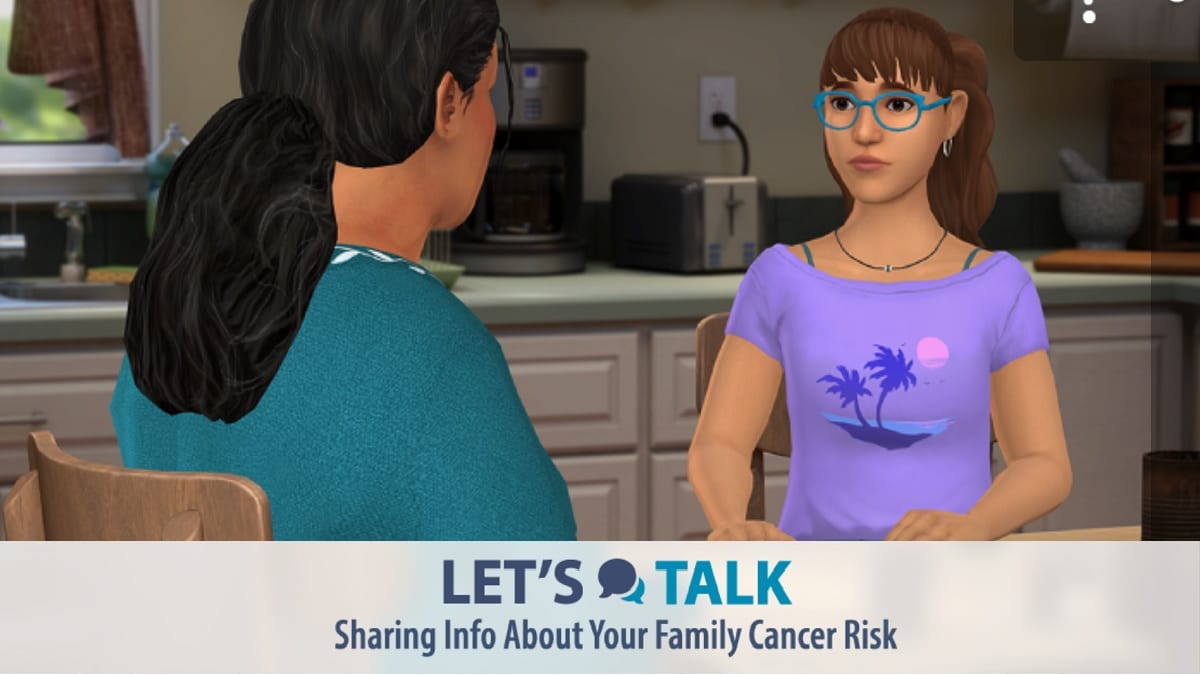Key points
- Tell your family members if you have a breast cancer (BRCA1 or BRCA2) gene mutation.
- Talking to family members can help them understand their risk for breast, ovarian, and other cancers.
- Family members who get genetic testing should be tested for the same mutation that you have.

Why talk about it
If you carry a change in your BRCA genes that raises your risk for breast, ovarian, and other cancers, this information can affect the health of other family members. Other people in your family may also have the gene change. It's important to share the information you learned from genetic counseling and testing with family members so they can make decisions for their own health.
Explain to your family members:
- BRCA gene mutations are passed through families.
- A person with a BRCA gene mutation is more likely to get breast, ovarian, and other cancers.
- Genetic counseling and testing for BRCA gene mutations can provide information about their risk.
- If they choose to be tested, they should be tested for the same mutation that you have.
- They can take steps to prevent cancer or find it early.
Tips for talking to your family
- Your parents, siblings, and children are most likely to have the same gene mutation you have. Other blood relatives, such as aunts, uncles, nieces, nephews, and cousins, are also more likely to have the mutation. Your doctor or genetic counselor can help you figure out who in your family might have the mutation.
- Giving family members information about your specific genetic mutation helps their doctors know which test to use.
- If you have a BRCA gene mutation, each of your children has a 50% (1 in 2) chance of also having it. Genetic testing is usually not recommended for children. Younger children may not understand what your mutation means. Answer the questions they ask. They will ask more complex questions as they grow and are ready to learn more.
My Family Health Portrait: Cancer
Videos
Watch these videos for advice on how to make these conversations easier from young women who were the first in their families to learn about their risk of hereditary breast and ovarian cancer.
The Importance of Sharing Your BRCA Genetic Test Results with Family
Hear how women who have tested positive for harmful changes in their BRCA genes have dealt with being the first in their families to learn about their high risk for cancer. Watch as they talk about the importance of sharing their genetic test results with their family members whose health may also be affected by this information.
Preparing for a Family Conversation About Your Breast Cancer Risk
After testing positive for harmful BRCA gene changes that raise their risk of breast and ovarian cancer, these women had to prepare to tell family members whose health may also be affected by this information. Hear about the fears they had about these conversations and how they prepared to inform their families.
How to Start the Conversation About BRCA Genetic Test Results with Family Members
Being the first in your family to learn that you have genetic changes that raise your risk of breast, ovarian, and other cancers can be hard because you have to tell your family about their own potential risk. Find out how these women started the discussion about the cancers that run in their families with family members who may also have higher risk.
The Positive Effects of Sharing Your BRCA Genetic Test Results with Family Members
When these women learned they carried a harmful change in their BRCA genes that was passed down in their families, they knew this information could affect the health of some family members. The conversations they started about their hereditary cancer risk positively affected some of their family members' health choices. One family member found breast cancer early.
Advice on Sharing Your BRCA Genetic Test Results with Family Members
Remember that you're not alone in facing tough conversations about the cancers that run in your family. You can ask for support from trusted family members or learn from others who have been in your place.
Taking Control
Eli was 24 years old when she learned she had a BRCA1 gene mutation. Her large family didn't talk about their family history of cancer. When Eli learned about her breast cancer risk, she knew it was time to change that.
Resources to share

Let's Talk: Sharing Info About Your Family Cancer Risk is an interactive tool to help you learn ways to talk about cancer risk with your family members.
